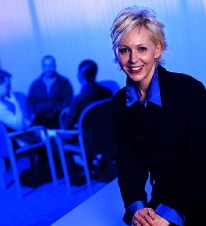"You can be physically fit without being well," says Keli M. Ballinger, suggesting the holistic approach of the University Health Services' (UHS) "wellness center," where she is program manager. Ballinger is also clinic/administrative director and clinical provider for the UHS Mind/Body Medical Institute (MBMI), an outpost of the eponymous program that Mind/Body Medical Institute associate professor of medicine Herbert Benson, M.D. '61, founded at New England Deaconess Hospital in Boston in 1988.
 |
| Keli M. Ballinger, who leads symptom-reduction groups |
| Photograph by Stu Rosner |
The wellness center offers a variety of resources--including yoga classes, nutritional consultation, and mind-body techniques for reducing stress--to Harvard faculty, students, and staff. "The techniques we provide have hundreds of studies supporting them," Ballinger says. "I practice these things myself!"
For the past three years, five times a year, MBMI has offered a 10-week Medical Symptom Reduction Program for groups of 12 to 15 people who may have only one thing in common: they are suffering from a symptom exacerbated by stress. This can mean insomnia, asthma, hypertension, gastrointestinal disorders, or migraines, as well as serious conditions like breast cancer, cardiovascular illness, and AIDS. For some conditions, "The diagnosis itself is a stressful event," Ballinger says. A fundamental component of the program is the "relaxation response," a meditative mind-body technique that Benson popularized in his 1975 book of that name. The aim is to help people reexamine thought patterns that sometimes distort or "catastrophize" their condition. This isn't simply "putting pink paint over a black spot and saying, 'It's all pretty now,'" cautions Ballinger. "It doesn't mean that the condition is going to change. But you may be able to think more rationally about the situation you are in."





